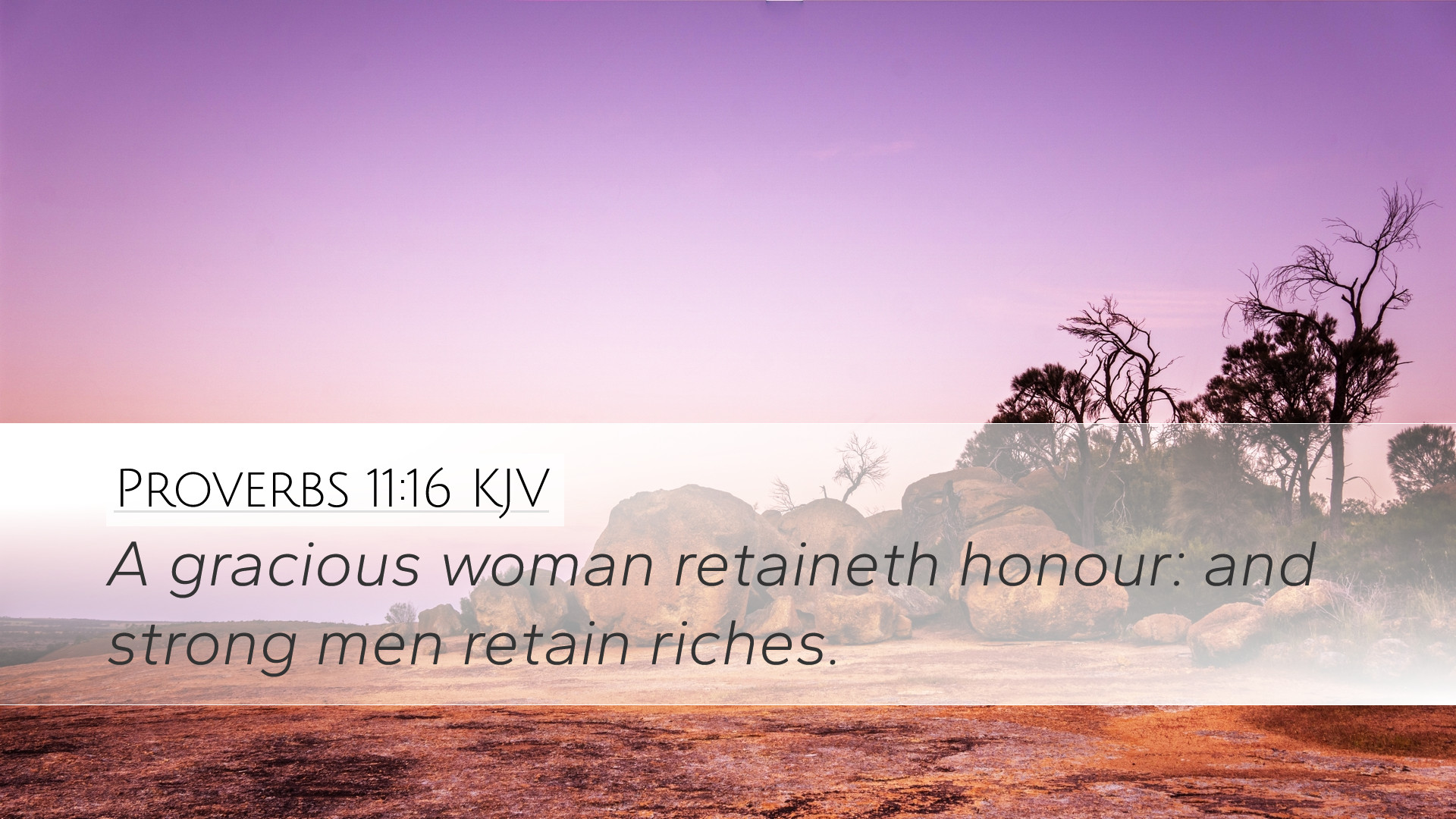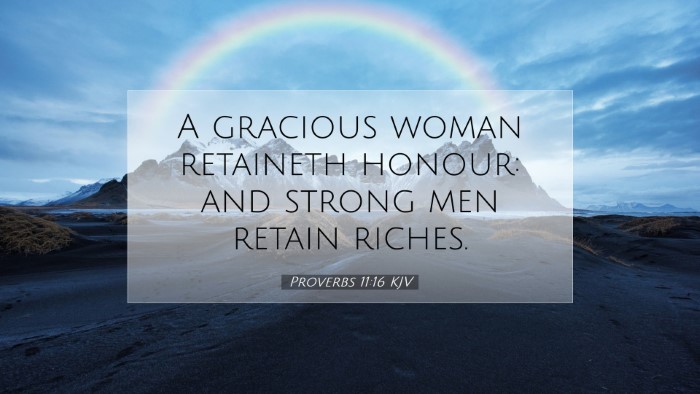Commentary on Proverbs 11:16
Proverbs 11:16 states, "A gracious woman retains honor, but ruthless men retain riches." This verse encapsulates the biblical truth that character and virtue hold more significant weight than material wealth. As we explore this verse in depth, we draw from the insights of renowned commentators such as Matthew Henry, Albert Barnes, and Adam Clarke.
Overview of the Verse
At first glance, Proverbs 11:16 contrasts two archetypes: the gracious woman and the ruthless man. The implication is that one's approach to life has far-reaching consequences not only on one's character but also on one's societal perception and moral standing.
Insights from Matthew Henry
Matthew Henry emphasizes the quality of grace in the context of femininity, suggesting that a virtuous woman, full of grace, is not just attractive but also honorable. He posits that her character garners genuine respect and reverence, which cannot be traded for wealth.
-
Honor and Reputation: Henry points out that honor is profoundly tied to one's character rather than material possessions. A gracious woman’s actions reflect kindness and integrity, which elevate her standing in society.
-
Wealth and Ruthlessness: The term "ruthless men" implies a pursuit of riches that often comes at the expense of moral integrity. Henry warns that such behavior, while may bring temporary gain, ultimately lacks true fulfillment and respect.
Insights from Albert Barnes
Albert Barnes offers a more contextual interpretation, asserting that the gifts of virtue and grace have an intrinsic value far surpassing material wealth. He considers the societal implications of both characters presented in the verse and underscores the following points:
-
Virtue Prevails: Barnes argues that a woman possessing grace demonstrates a resilient and stable character. Her honorable actions lead to a reputation that can withstand the trials of life.
-
Materialism's Shortcomings: He highlights that ruthless pursuit of wealth can often lead to a lonely existence filled with peril. Such men may gain riches, but they risk losing meaningful relationships and genuine respect from others.
Insights from Adam Clarke
Adam Clarke brings to light the cultural context behind the Hebrew terms used in the verse. He makes the following observations:
-
Graciousness as a Virtue: Clarke expands on the idea of grace, defining it not just as kindness but also as a strength that earns true honor. He suggests that graciousness aligns closely with godliness, and thus, the favor of God rests on such individuals.
-
Ruthlessness as a Character Flaw: Clarke elucidates that the ruthless acquisition of wealth often stems from pride and a lack of empathy. He elucidates how this leads to a community not based on trust or respect but rather fear and manipulation.
-
The Lasting Impact of Character: Clarke concludes by affirming that the legacy left by a gracious woman far outlives the fleeting nature of wealth amassed through ruthless means.
Theological Implications
Proverbs 11:16 speaks to the core of Christian ethics, denouncing the love of wealth while extolling the virtues of grace and honor. The theological implications derived from the commentaries include:
-
The Value of Character: In the Christian worldview, the fruit of one’s character—the manifestation of grace—determines not just earthly reputation but eternal significance.
-
God’s Economy vs. Worldly Economy: This verse serves as a reminder that God’s principles counter the norms of the world, where often, pound-for-pound, morality is overshadowed by materialism.
-
Practical Applications: Pastors and students should apply this wisdom by promoting values that foster community, emphasizing the importance of interpersonal relationships over financial success alone.
Conclusion
In summary, Proverbs 11:16 teaches that a gracious character is to be treasured and aligns with divine principles. The insights derived from Matthew Henry, Albert Barnes, and Adam Clarke collectively encourage readers to treasure virtues like grace and honor, which stand firm against the impermanence of wealth. Ultimately, it is this foundation of graciousness that leads to a life marked by lasting respect, true joy, and, importantly, alignment with God’s heart.


